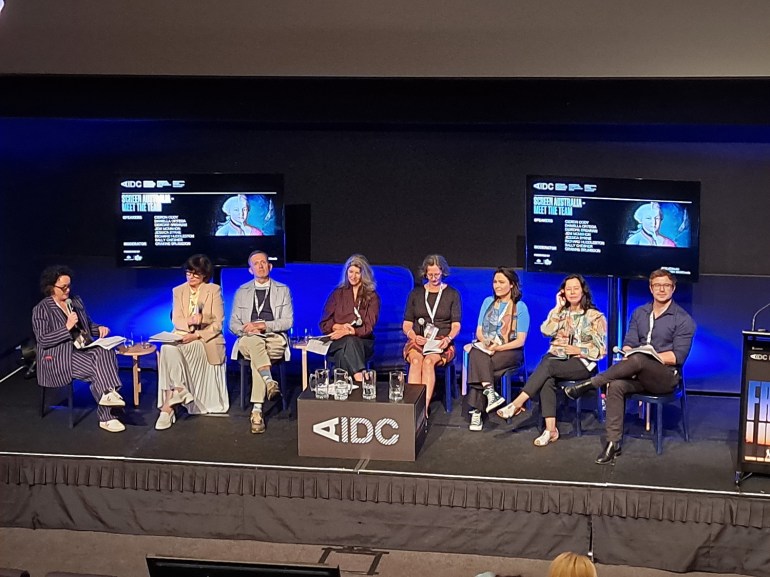New Screen Australia CEO Deirdre Brennan gave an early indication of her goals for the agency on day two of the Australian International Documentary Conference, including a mantra to “put the audience at the heart of everything we do”.
Brennan, who joined the agency from Canada’s WildBrain in January, was one of eight personnel to appear as part of Screen Australia’s ‘Meet the Team’ session on Monday, along with new head of documentary Richard Huddleston.
When asked by moderator and Screen Australia content director Grainne Brunsdon what she had been focusing on in her first few weeks and what she saw as the challenges for the industry going forward, she said her short-term priorities were “really to understand how we work” and to reconnect back to the Australian industry after eight years away.
“This first seven weeks, particularly moving back to a place I call home, has been a great opportunity to reflect over the summer on what I can bring to this role,” she said.
“The majority of my experience has been with the kids and family side of the business and there are a lot of parallels [with the documentary sector] which should never be underestimated.
“We’re very entrepreneurial in the way we create content and tell our stories and we have an incredible role to play, because we understand the impact of content on our current society and on future generations.
“We work at the intersection of technology and content – that front line – and most importantly we have an understanding of the massive shifts in audience behaviours that are affecting both business models and the audience we serve and engage with.”
She said that although there were “extraordinary challenges” for the industry, specifically referencing a global contraction, Australians had every reason to feel optimistic about because of “the way they work”. She added there was “a lot of thinking, working, and collaborating” to do with both the Screen Australia team and the sector to plot out the next steps for the agency.
“One thing I did think about a lot was what my vision for the organisation would be, to facilitate this rather difficult time we will be working through together,” she said
“I think it’s really important that we’re a trusted organisation that inspires you and inspires innovation.
“We have to work hard to do that; trust is something you earn and respect, and is something you need to constantly measure. I think there’s some great work to build on, but it’s a priority for me.”
Brennan also said she wanted Screen Australia to be a partner for all of the industry and “not just the projects that we are involved with”.
“We can build on things together, but there’s a lot that we need to do to achieve that partnership level, moving from a reactive state to a responsive state,” she said.
“If we can help you anticipate market trends and opportunities and if we underpin that with meaningful data and insights and then share that loudly, I think we’d go a long way to becoming that partner for you all.”
One of the perennial questions for the industry is how to get greater cut through internationally, with Brennan’s predecessor Graeme Mason noting during last year’s Screen Forever that he did not believe enough Australian content was selling overseas.
Brennan said finding Australian content while she was in North America “was really hard”, going on to emphasise the importance of understanding distribution and pathways to audience in other parts of the world.
“I think this is something in which we have a role to play and something that is my mantra; we put the audience at the heart of what we do,” she said.
“It doesn’t mean we are chasing audience; it means we have to understand what is happening in Australian society and where audiences of the future are, because it impacts everything we do.”
It’s a point that was reiterated by Huddleston, who said he had spent his first few weeks in the role examining his department’s partnerships within the agency while picking the brains of producers to “try to find some common ground that we can then put into our strategy”.
“Looking at the documentary unit, I’ve learned that since 2021, this team has assessed 597 projects, funded 230 projects with 180 different producers or SPEs, so we interrogate a lot of content,” he said.
“I’ve been really impressed with the level of expertise and forensic examination of creative, teams, budget, finance plans, and also of audience – it’s not just about the idea, it’s about where your audience is”.


